Jun. 22, 2015 7:26 AM ET
Summary
- We continue to hear Paul Krugman 'knocking" the austerity of the UK.
- Has the UK done worse than the USA in economic growth?
- Is the UK really implementing "austerity"?
A country which has its own currency is not similar to business or personal finance as it can create spending money out of thin air (depending on many factors, it can have negative consequences). It does, however, create political fodder as people understand budgeting, and most voters and politicians are bothered by the continual growth of deficits and sovereign debt.
On the other hand, a politically-motivated economist says austerity is one of the Seriously Bad Ideas, and government deficit spending is not concerning.
And the ultimate example of a seriously bad idea [austerity] is the determination, in the teeth of all the evidence, to declare government spending that helps the less fortunate a crucial cause of our economic problems. In the United States, I'm happy to say, this idea seems to be on the ropes, at least for now.Throughout my life managing projects around the world, I have watched "proven" methods fail. What my life experiences have taught me is that there is no single "correct" solution. I am from an industry with loads of historical data, high span of control ability, and myriads of real-time data inputs (which are continuously morphed to optimize). The decision process for action begins with situational awareness, and solutions selected usually mimicked past solutions in similar situations.
There was never an allusion that mimicking a past solution would work in current situation. The goal was to stay within the planned perimeters - or change the perimeters. In all events, the situation is closely monitored and if the expected results are not occurring, the solution is either modified or replaced with another. There was seldom any resistance to changing a solution which was not working. Data does not lie.
Economic management is in the political arena. Few politicians will change any of their positions even with overwhelming evidence that it was a bad idea. I guess the politicians' rule book says if you change your idea, you are weak and wishy-washy. I guess I am as wishy-washy as John Maynard Keynes who famously said (attributed):
"When the facts change, I change my mind."If the facts support your objectives, continue. If facts do not support your objective, revise what you are doing.
Now back to this continuing debate between austerity or deficit spending. Did the USA take the path of deficit spending while the UK took the path of austerity? The UK did not do too badly with unemployment.
Unemployment UK (blue line) vs. USA (red line)
(click to enlarge)
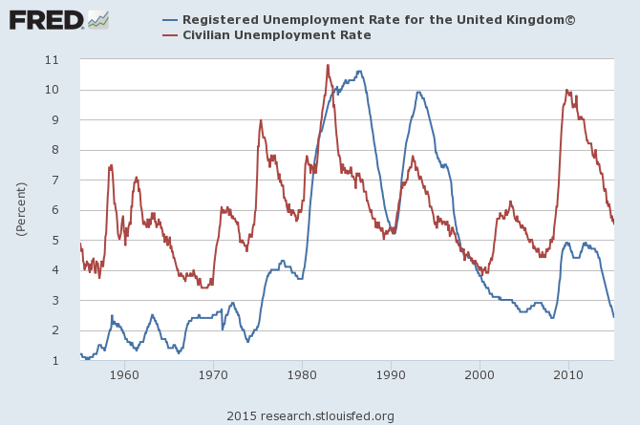
The UK did not do too badly with GDP.
GDP UK (blue line) vs. USA (red line)
(click to enlarge)
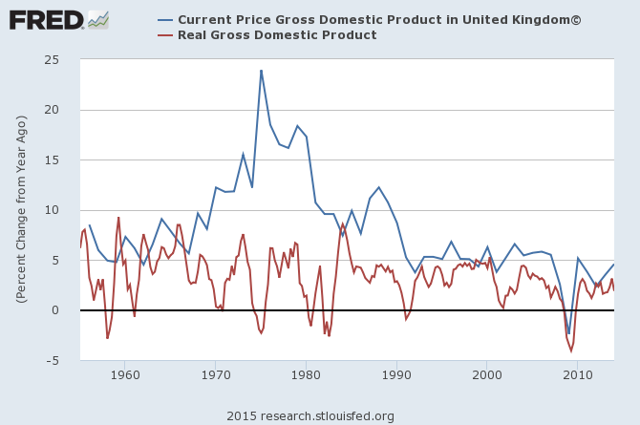
The UK government spending as a percent of GDP peaked in 2009 and tapered since then (austerity?). [hat tip economicshelp.org] Please note the high percentage of UK government spending to GDP.
(click to enlarge)
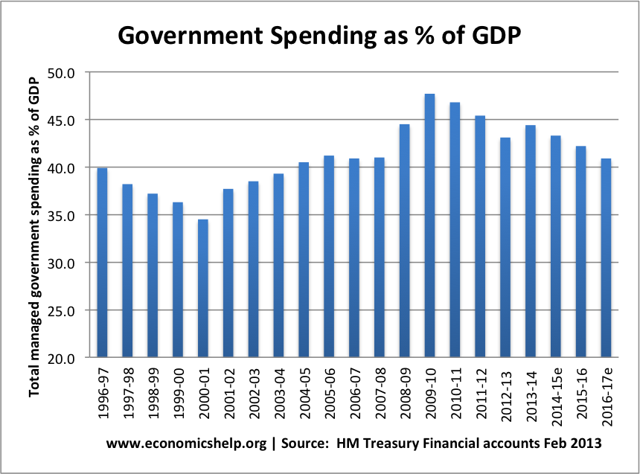
The USA government spending peaked in 2009/2010 and tapered since then (austerity?).
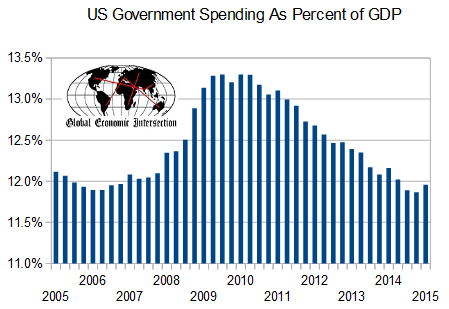
Funny thing about labels like austerity. The UK seems to be doing a lot of deficit spending. [hat tip ukpublicspending.co.uk]
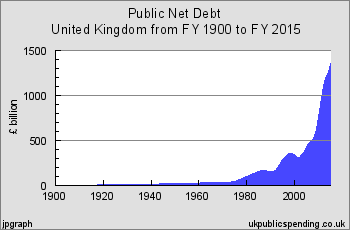 | 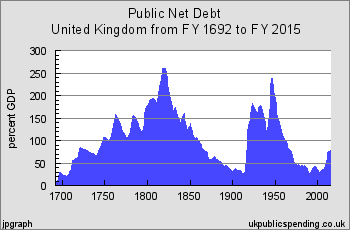 |
The USA is deficit spending as well.
(click to enlarge)

There are few things in economics as stupid as this debate which seems not based on any fact - it is often simply a theoretical and baseless argument. The example discussed of "austerity" in the UK and "no austerity" in the U.S. seems to point out what is often the case: The definition of austerity is determined by the political persuasions of the party in power and the party not in power. Of course there are cases where the term is definitely beyond the "coloration" of political persuasion - the current experience of Greece being a notable example.
0 comments:
Publicar un comentario